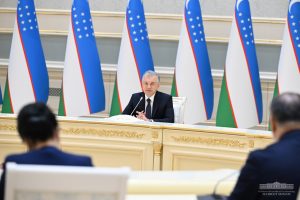Consultations continue regarding amendments to Uzbekistan constitution, but on March 6 a final draft was reportedly prepared.
Uzbekistan embarked rather disastrously on a constitutional revision process last year with the late June release of a draft that included, among other controversial provisions, the scrapping of the Karakalpak Republic’s autonomous status and most critically its constitutional right to secede. The original release of the draft envisioned a 10-day period of public comment, but events quickly overtook plans. Protests erupted in Nukus, Karakalpakstan’s capital. The protests were suppressed and Uzbek President Shavkat Mirziyoyev flew to the region to personally announce the scrapping of those particular provisions.
The constitutional reform process has since marched slowly and carefully onward, just as the state has pursued dozens of charges against more than two dozen defendants.
In late January, a court in Bukhara handed down sentences in the first of two trials of individuals stemming from the unrest in Karakalpakstan. Dauletmurat Tadzhimuratov, a lawyer and journalist accused of orchestrating the unrest, was sentenced to 16 years in prison.
Tazhimuratov had publicly called for a “no” vote if a referendum was held. He said he would “personally [go] to a peaceful and legal rally” to demand a referendum on secession from Uzbekistan if such amendments were approved. For this — and for the reaction of the public to his initial arrest — he was tried and convicted of, among other things, “allegedly plotting to seize power by disrupting the constitutional order” and “organizing mass unrest.” Given that Karakalpakstan’s right to secede is literally in the constitution — and various laws technically protect the rights to speech and assembly — it is perplexing that calling for such a thing has been judged as illegal.
A second trial is ongoing, with 39 people on trial facing various charges. As Eurasianet reports, this second trial has received far less attention both inside and outside Uzbekistan, although authorities are seeking dozen-year sentences for some of the defendants.
With the Karakalpakstan amendments set aside, one of the more closely watched aspects of the looming referendum is its impact on Mirziyoyev. Earlier drafts included the lengthening of the presidential term from five to seven years. Will this change, as it did under the administration of Islam Karimov, “zero-out” Mirziyoyev’s two five-year terms as president and present him with the opportunity to occupy the Uzbek presidency for years to come? And what does that say about the political development of Uzbekistan, about its democracy?
Last summer, various reports stated that the draft included amendments and additions to more than 60 articles in the constitution. Whenever the referendum is actually scheduled, some will ask if the Uzbek people have been sufficiently informed about the impact of these many changes. And given Uzbekistan’s history of elections judged as neither free nor fair, some with wonder if they have any choice at all.
Mirziyoyev hosted a meeting on March 6 with deputies from the Oliy Majlis’ Legislative Chamber and Senate, as well as the leadership of the country’s Supreme Court, to consider the results of public feedback on constitutional amendments. According the president’s office, more than 200,000 proposals were submitted and considered. The press release stresses that before the constitutional revisions are submitted for a referendum there have been several months worth of consultations. “In this process, the parliament and the government, members of the public express their proposals and opinions on the draft law.” Separately, Uzbekistan’s Constitutional Court will also weigh in.
In December, RFE/RL’s Uzbek Service had reported a government source suggesting the referendum would be held in the spring, after the Nowruz holiday in late March. A specific date has not been announced, but it’s clear that the Mirziyoyev government is preparing to make a play at constitutional change soon.

































